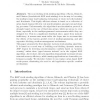Free Online Productivity Tools
i2Speak
i2Symbol
i2OCR
iTex2Img
iWeb2Print
iWeb2Shot
i2Type
iPdf2Split
iPdf2Merge
i2Bopomofo
i2Arabic
i2Style
i2Image
i2PDF
iLatex2Rtf
Sci2ools
106
click to vote
WDAG
2004
Springer
2004
Springer
Dynamic Memory ABP Work-Stealing
The non-blocking work-stealing algorithm of Arora, Blumofe, and Plaxton (hencheforth ABP work-stealing) is on its way to becoming the multiprocessor load balancing technology of choice in both Industry and Academia. This highly efficient scheme is based on a collection of array-based deques with low cost synchronization among local and stealing processes. Unfortunately, the algorithm’s synchronization protocol is strongly based on the use of fixed size arrays, which are prone to overflows, especially in the multiprogrammed environments which they are designed for. This is a significant drawback since, apart from memory inefficiency, it means users must tailor the deque size to accommodate the effects of the hard-to-predict level of multiprogramming, and add expensive blocking overflow-management mechanisms. This paper presents the first dynamic memory work-stealing algorithm. It is based on a novel way of building non-blocking dynamic memory ABP deques by detecting synchronizat...
Algorithms | Memory Abp Deques | Non-blocking Work-stealing Algorithm | WDAG 2004 | Work-stealing Algorithm |
Related Content
| Added | 02 Jul 2010 |
| Updated | 02 Jul 2010 |
| Type | Conference |
| Year | 2004 |
| Where | WDAG |
| Authors | Danny Hendler, Yossi Lev, Nir Shavit |
Comments (0)

